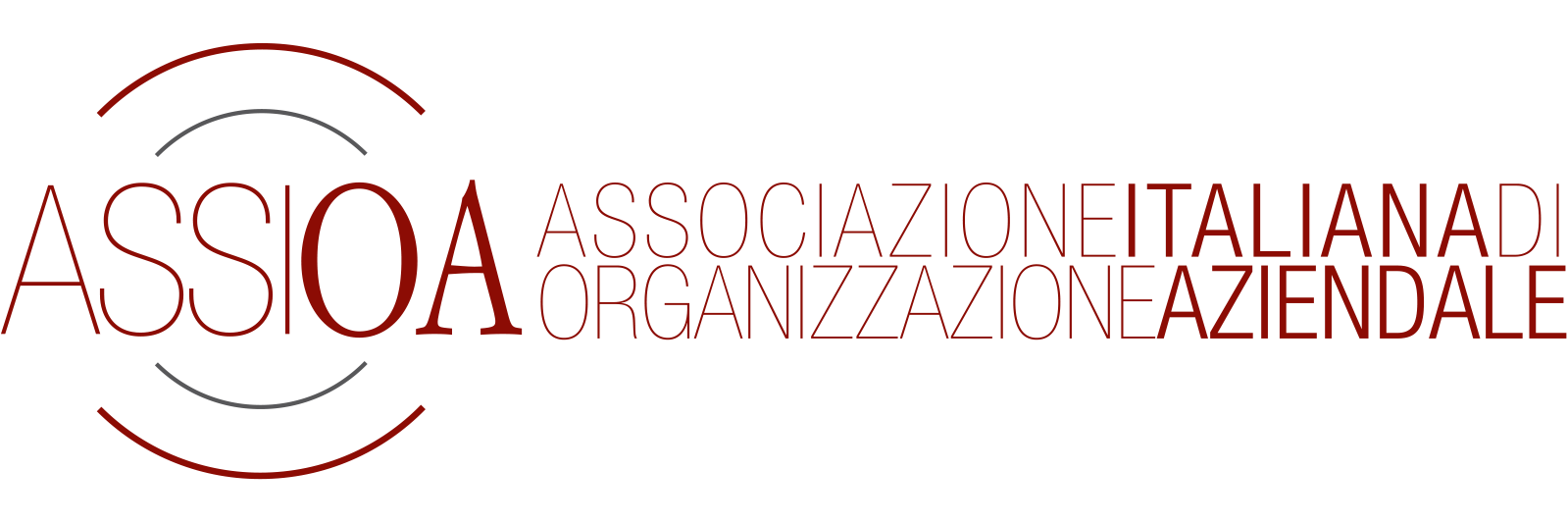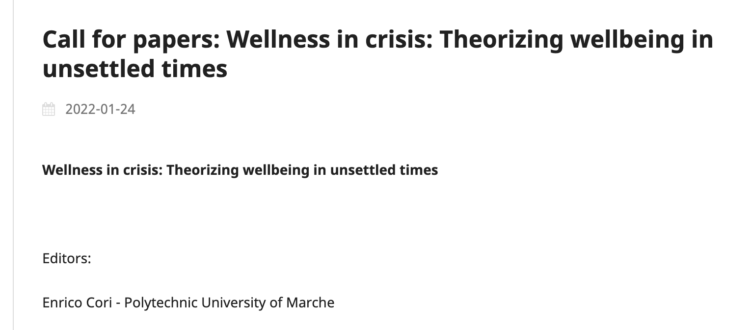Call for papers: Wellness in crisis: Theorizing wellbeing in unsettled times
Editors:
Enrico Cori – Polytechnic University of Marche
Gazi Islam – Grenoble École de Management
Daria Sarti – University of Florence
Teresina Torre – University of Genoa
Beliz Ulgen – Istanbul Commerce University
As a field of practical and scholarly concern, wellbeing is at a crossroads. Seen one way, scholarship on wellbeing is flourishing, with expanding and interdisciplinary research agendas (Liu et al., 2018; Sointu, 2015) and a strong interest in wellbeing practices (von Woerkom, 2021). On the other hand, wellbeing as a concept has been increasingly problematized in links with neoliberal workplaces (Cederström & Spicer, 2015; Davies, 2015) and “toxic positivity” (Halberstam, 2011), raising suspicions that, beyond its humanistic pretentions, wellbeing may have a dark side, invoking the “happiness duty” (Ahmed, 2010) to promote managerial control and thwart workplace critique (cf., Islam & Sferazzo, 2021). Underlying this tension is the ongoing difficulty of defining and measuring the elusive concept of wellbeing. Various alternative conceptualizations and measurement attempts reflect different philosophical, psychological, and organizational uses of the concept (Alexandrova, 2012; 2017; Ottaviani, 2015).
Against this complex background should be located the emergence of parallel global crises and disruptions, from the rapid onset of COVID-19, to the accelerating threat of ecological collapse and climate crisis, the increasing social and economic inequality within and across regions of the globe, and the related political and institutional instabilities exacerbated by all of these factors. The latter reshape organizational practices and, ultimately, how we think about work and organizing themselves. In this context, wellbeing represents a central concept to which organizational literature is giving renewed interest (Fisher, 2014; Laine, Rinne, 2015; Litchfield, Cooper, Hancock, Watt, 2016; Vakkayil, Della Torre, Giangreco, 2017; Leiter, Cooper, 2017; Sorensen, Dennerlein, Peters, Sabbath, Kelly, Wagner, 2021).
In this call, we wish to stimulate reflection over and above organizational wellbeing policies and practices (Salas-Vallina et al., 2020) towards understanding and shaping the very meanings of wellbeing and their temporal and spatial dynamics.
We believe that priority should be given to addressing the topic of organizational wellbeing in its varied forms. Given the complexity describe above, research should involve multiple disciplinary, methodological and paradigmatic facets to meet the requisite complexity of the topic.
The first question on which it is challenging to reflect is relates to the meanings and conceptualizations of wellbeing (Alexandrova, 2017; Dodge, Rachel, et al., 2012). Do we think of wellbeing primarily in terms of concepts of thriving or flourishing, attempting to link it to workplace pursuits and increased performance? Do we consider it, in experiential terms, according to the lived experiences and meanings of wellbeing (cf., Sointu, 2015)? Or do we focus on wellbeing as a mechanism of power and “affective” control (Ahmed, 2010), by which organizations come to shape the hearts and minds of their workers? Related to the issue of meanings of wellbeing are the definitional and measurement issues that have always elicited philosophical quandaries within the field (Alexandrova, 2012) – can wellbeing be defined and measured, or is there something about it that is “beyond” measure (Butler et al., 2020)?
A second question concerns the relationship between organizational choices and wellbeing. In particular, we question how wellbeing relates to specific organizational tools and practices or whether it should be considered intrinsically linked to core management aspects such as safety, autonomy, control, flexibility (Pagán-Castaño, Maseda-Moreno, Santos-Rojo, 2020). Moreover, attempts to promote workplace wellbeing can give rise to new forms of control (Jenkins & Delbridge, 2014) and create new forms of anxiety (Picard & Islam, 2020). So, are there ways of promoting wellbeing that cannot be appropriated for instrumentalist or control-oriented ends?
A third, broader issue concerns the opportune link between different disciplines in addressing the issue of wellbeing in organizations. Can other research streams besides organization inform the pursuit of workers’ wellbeing conditions? How can the different disciplines work together, and with which methodological approaches? Ideal here would be work that moves beyond overly psychologistic interpretations of wellbeing to interrogate structural, sociological, and political approaches to wellbeing.
The current conjuncture also suggests particular attention to the crisis dimension. This is the reason we propose a reflection that starts from the concept of “wellness in crisis”; this expression implies a twofold perspective: that of “wellness in times of crisis” and that of “the crisis of wellness”. We invite scholars to reflect on what meaning(s) the concept of wellbeing may assume in the current situation and what possible organizational choices could be read as “wellbeing-oriented” in these times, also in light of changes in work organization induced by the “COVID-agenda” (Brazeau, Frenzel, Prescott, 2020; Nayal, Pandey, Paul, 2021).
However, despite our situatedness in the current moment, we want to stimulate a broad reflection linked to the long wave of transformations in the labor market and, more generally, in society (Kalliath, Kalliath, 2012; Kossek, Kalliath, Kalliath, 2012). Among these, it is worth analyzing the growing tendency towards precarisation and individualization of work (Joyce, Pabayo, Critchley, Bambra, 2010; Lewchuk, 2017; Berger, Frey, Levin, Danda, 2019; Keith, Harms, Long, 2020; Apouey, Roulet, Solal, Stabile, 2020), but also the socio-demographic dynamics that contribute to redesigning the labor market and to redefining the areas of competence and employment conditions (Johnson, 2013; Ravenswood, Harris, Wrapson, 2017). Finally, the intersection between the perspective of wellbeing and that of sustainability is noteworthy (Ochoa, Lepeley, Essens, 2018). Sustainability is a kind of holistic concept for organizations and includes their employees’ commitment and workplace happiness, too. Various challenges to organizations regarding sustainability goals and wellbeing practices are expected in the new normal that refers to the period after the COVID-19. In this perspective we underline: the types of remote or hybrid works that have become rapidly widespread and their effects on employees, new challenges in employment due to the expanded use of artificial intelligence and technology, the new online communication styles that caused different stresses on employees, the emerging issues in establishing work-private life balance, changing competitive conditions.
Based on the described tensions and considering the wide range of studies that can be traced back to the proposed research lines, in this special issue, we invite papers that address, but are not limited to, the following possible research topics:
- Wellbeing, safety, and security in the time of COVID_19
- Work from home: chiaroscuro effects on work-life balance and wellbeing
- The two faces of flexible work: implications for wellbeing
- Autonomy, discretion, and control: a never interrupted relationship with wellbeing
- Wellbeing: the object of desire for precarious workers?
- Ageing workforce: revisiting wellbeing policies and practices?
- Workforce diversity: inclusion as a relevant issue for wellbeing
- Redesign wellbeing: challenges for the HR management function
- Alternative practices of organizational wellbeing
- At the crossroads of policies and practices oriented towards sustainability and organizational wellbeing
- The research on wellbeing in an interdisciplinary perspective: possible lines of development and methodological implications
- The new normal challenges for sustainability and wellbeing
- Wellbeing and Technology.
The actual aim is to deepen and expand the scientific knowledge on wellbeing within the organization studies. Considering the vastness and variety of the field of investigation, both theoretical and empirical research is called for. Either qualitative or quantitative or mixed methods research is welcome.
This call for paper is inspired by the theme proposed for WOA 2022 – Workshop of Italian Organizational Scholars scheduled in Brescia on May 26th and 27th, 2022, and aimed to inquire the following question:
“Are we ready to manage the unexpected? Exploring antifragility, resilience, and wellbeing in organizations”.
The issue editors will select the best papers presented at WOA 2022 to be included in the puntOorg issue. The selection will assess the potential contribution to the theoretical and empirical investigation of the issues described. Accordingly, the call addresses the attention of the workshop attendees, but it is not limited to them.
Main references
Butler, N., Delaney, H., Hesselbo, E., and Spoelstra, S. (2020), Beyond measure. Ephemera, 20 (3): 1-16.
Cederström, C. and Spicer, A. (2015), The Wellness Syndrome, Cambridge: Polity Press.
Davies, W. (2015), The happiness industry: how the government and big business sold us wellbeing, London: Verso.
Halberstam, J. (2011), The Queer Art of Failure, London: Duke University Press.
Islam, G., Sferrazzo, R. (2021), Workers rites: Ritual mediations and the tensions of new management. Journal of Management Studies, onlinefirst.
Jenkins, S., Delbridge, R. (2014), “In pursuit of happiness: A sociological examination of employee identifications amongst a ‘happy’ call-centre workforce”, Organization, 21 (6): 867-887.
Liu, Y., L. Cooper, C., and Y. Tarba, S. (2019), “Resilience, wellbeing and HRM: A multidisciplinary perspective”, The International Journal of Human Resource Management, 30 (8): 1227-1238.
Le Roy, A., Offredi, C., and Ottaviani, F. (2015), “The challenges of participatory construction of social indicators of wellbeing”, Social Indicators Research, 120 (3): 689-700.
Sointu, E. (2005), “The rise of an ideal: tracing changing discourses of wellbeing”, The sociological review, 53 (2): 255-274.
Van Woerkom, M. (2021), “Building Positive Organizations: A Typology of Positive Psychology Interventions”, Frontiers in Psychology, 12, 769782.
Deadline for full paper submission: 31 January 2023
Before submitting your manuscript, authors are required to carefully check that the paper has been reviewed through a rigorous proofreading process.
Before submitting your manuscript, please ensure you carefully read and adhere to puntOorg philosophy and puntOorg guidelines for pIJ authors.



